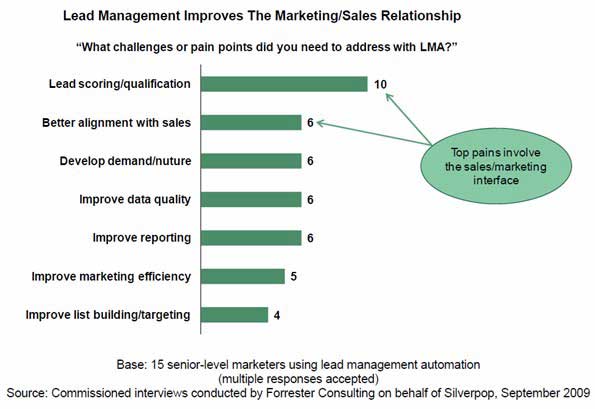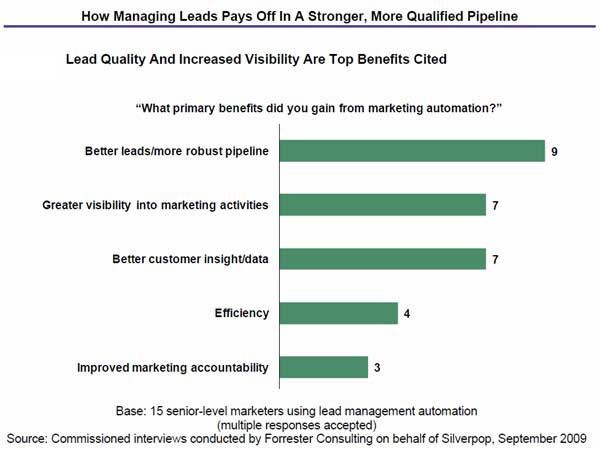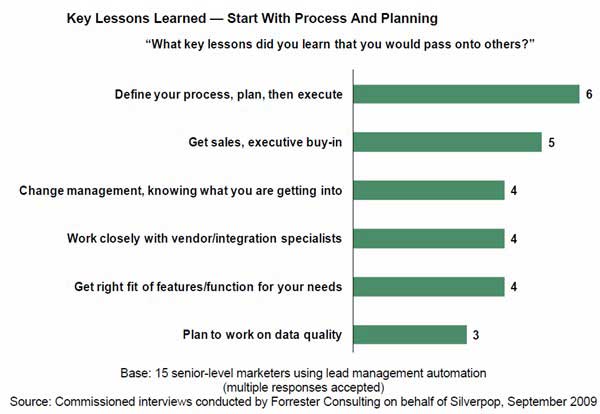B2B marketers who develop consistent lead-management processes––along with careful investments in automation––achieve stronger, more qualified sales pipelines, according to interviews conducted by Forrester Consulting on behalf of Silverpop.
In addition, through better visibility into the impact of marketing on sales, companies that implement lead automation gain more control over marketing programs and better accountability for marketing spend against business results, the interviews found.
Below, additional findings from How Managing Leads Pays Off in a Stronger, More Qualified Pipeline, a report based on interviews with 15 senior-level marketers who use lead management.
Strengthening the Sales Pipeline
Asked to describe the problems they wanted to solve with lead-management automation, surveyed marketers overwhelmingly cited the need to prioritize sales opportunities: 67% (10 out of 15 of marketers) said lead scoring and qualification was a major challenge.

Without an orderly approach, lead qualification becomes subjective and the results are suspicious to Sales, Forrester said. To reduce the squabbling between Marketing and Sales over lead quality, marketers want more systematic measurable approaches to scoring the leads that marketing activities create.
As for other challenges, 40% of the marketers cited four other pain points, including better alignment with Sales, developing and nurturing demand, improving data quality, and improving data reporting.
Looking for real, hard data that can help you match social media tools and tactics to your marketing goals? The State of Social Media Marketing, a 240-page original research report from MarketingProfs, gives you the inside scoop on how 5,140 marketing pros are using social media to create winning campaigns, measure ROI, and reach audiences in new and exciting ways.
How Lead Management Pays Off
Despite its early adoption stage and limited experience as a practice, lead management delivers real business value, according to the interviewed marketers:

Healthier sales pipelines: 60% of the marketers said better leads/a more robust pipeline—including factors such as increased lead quality, opportunity-to-pipeline conversion, and deal velocity––are a primary benefit from marketing automation.
Greater accountability for marketing impact on business: 47% of the marketers said greater visibility into marketing activities has been a primary benefit of automation, and 47% additionally cited better customer insight/data.
By removing the guesswork from process design—through stronger reporting functionality and the ability to measure marketing contributions more precisely—marketers gain control over programs and are better prepared to respond to sales and management demands, Forrester said.
Efficiency in spending and resource use: 27% of the marketers said efficiency has been a primary benefit of automation, and 20% cited improved marketing accountability.
Most of the marketers have suffered budget cutbacks due to the recession and many have weathered reductions in staff and resources by cleaning up customer data records, automating communications, and nurturing prospects with more personal content.
The marketers have replaced so-called "spray-and-pray" approaches with campaigns aimed at invigorating stale contacts, reducing churn, or winning back defectors—programs that demand automating customer profiling and outreach.
Process and Collaboration Leads to Successful Implementation
Sharing lessons learned, the interviewed marketers offered the following recommendations to help others avoid common pitfalls:

Focus on process change, don't simply roll out technology: 40% of the marketers suggested defining internal processes first, followed by planning and executing. The basics they stressed are as follows: Map-out processes, put milestones in place, make someone's job dependent on achieving the plan, and (finally) select your technology partner.
Collaborate early with Sales and get the team involved in the process: 33% of the marketers said getting Sales and executive buy-in is critical to the automation process. Although marketers typically sponsor lead-management projects, sales departments benefit most from stronger, more predictable pipelines.
Meanwhile, process redesign often uncovers problems in the sales process, especially around lead handoff between Marketing and Sales.
The marketers said teamwork and open communication with Sales are essential to successful lead-management implementation.
Keep management expectations from escalating: 27% of the marketers said change management is important to automation success. Sales and executives often think that lead-management tools automatically boost the flow of leads in pipelines.
The marketers stressed the importance of setting––and defending––project timelines that start with simple contact activation campaigns and demographic lead scoring, and then progress to more complex nurturing campaigns that trigger off of changes in behavior and interest.
About the findings: Conducted by Forrester Consulting on behalf of Silverpop, the study contains information from in-depth interviews with 15 B2B marketing professionals working at small to midmarket US firms (100-5,000 employees) in September 2009.



